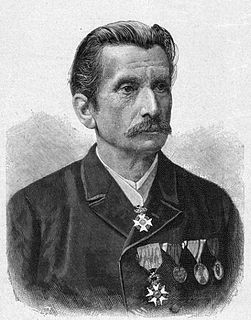A Quote by Ambrose Bierce
NEIGHBOR, n. One whom we are commanded to love as ourselves, and who does all he knows how to make us disobedient.
Related Quotes
We are not commanded (or forbidden) to love our mates, our children, our friends, our country because such affections come naturally to us and are good in themselves, although we may corrupt them. We are commanded to love our neighbor because our natural attitude toward the other is one of either indifference or hostility.
We are not taught "love thy neighbor unless their skin is a different color from yours " or "love thy neighbor unless they don't make money as you do" or "love thy neighbor unless they don't share your belies." We are taught "love thy neighbor". No exceptions. We are all in this together - every single one of us. And the only way we are going to survive as a society is through compassion. A Great Community does not mean we all think the same things or do the same things. It simply means we are willing to work together and are willing to love despite our differences.
I beg Our Lord, Monsieur, that we may be able to die to ourselves in order to rise with Him, that he may be the joy of your heart, the end and soul of your actions, and your glory in heaven. This will come to pass if, from now on, we humble ourselves as He humbled Himself, if we renounce our own satisfaction to follow Him by carrying our little crosses, and if we give our lives willingly, as He gave His, for our neighbor whom He loves so much and whom He wants us to love as ourselves.
What is this Charity, this clinking of money between strangers, and when did Charity cease to be a comforting and secret thing between one friend and another? Does Love make her voice heard through a committee, does Love employ an almoner to convey her message to her neighbor? ... The real Love knows her neighbor face to face, and laughs with him and weeps with him, and eats and drinks with him, so that at last, when his black day dawns, she may share with him, not what she can spare, but all that she has.
Perhaps because the origins of a certain kind of love lie in an impulse to escape ourselves and out weaknesses by an alliance with the beautiful and noble. But if the loved ones love us back, we are forced to return to ourselves, and are hence reminded of the things that had driven us into love in the first place. Perhaps it was not love we wanted after all, perhaps it was simply someone in whom to believe, but how can we continue to believe the the beloved now that they believe in us?
God’s love sets us free from the need to seek approval. Knowing that we are loved by God, accepted by God, approved by God, and that we are new creations in Christ empowers us to reject self-rejection and embrace a healthy self-love. Being secure in God’s love for us, our love for Him, and our love for ourselves, prepares us to fulfill the second greatest commandment: To love our neighbor as ourselves.
Love knows no virtue, no profit; it loves and forgives and suffers everything, because it must. It is not our judgment that leads us; it is neither the advantages nor the faults which we discover, that make us abandon ourselves, or that repel us. It is a sweet, soft, enigmatic power that drives us on. We cease to think, to feel, to will; we let ourselves be carried away by it, and ask not whither?
Let us give ourselves to the Immaculata [Mary]. Let her prepare us, let her receive Him [Jesus] in Holy Communion. This is the manner most perfect and pleasing to the Lord Jesus and brings great fruit to us." Because "the Immaculata knows the secret, how to unite ourselves totally with the heart of the Lord Jesus... We do not limit ourselves in love. We want to love the Lord Jesus with her heart, or rather that she would love the Lord with our heart.
As the world attracts us with its appearance, and abundance and variety, it is not easy to turn away from it unless in the beauty of things visible the Creator rather than the creature is loved; for, when He says, 'you shall love the Lord your God from all your heart, and from all your mind, and from all your strength' (Mt. 22:37), He wishes us in nothing to loosen ourselves from the bonds of His love. And when He links the love of our neighbor also to this command, He enjoins on us the imitation of His own goodness, that we should love what He loves and do what He does.
The unbreakable bond between love of God and love of neighbor is emphasized. One is so closely connected to the other that to say that we love God becomes a lie if we are closed to our neighbor or hate him altogether. Saint John's words should rather be interpreted to mean that love of neighbor is a path that leads to the encounter with God, and that closing our eyes to our neighbor also blinds us to God.
The first great commandment was to love the Lord our God with all our hearts, might, mind and strength; and the second was like unto it, to love our neighbor as ourselves. And the best way in the world to show our love for our neighbor is to go forth and proclaim the gospel of the Lord Jesus Christ, of which He has given us an absolute knowledge concerning its divinity.
The term revolution means: a sudden, radical, and complete change from the way things are normally done. I love that definition because I really feel that in order for us to start walking in the kind of love that Christ commanded us to - the "love your neighbor as yourself" kind - it's going to take a radical change in our current behavior. The church has become passive and selfish and it's going to take a revolution to get us back to the place where we are not just talking the talk, but walking in a love that shows the world Christ's love.
He is not far off; He is there, very close. He is looking at us, and He is begging this sorrow, this agony from us. He needs it for souls and for our soul... Alas, it does pain Him to give us sorrows to drink, but He knows this is the only means of preparing us to know Him as He knows Himself and to become God's ourselves.
It is worth the while to live respectably unto ourselves. We can possibly get along with a neighbor, even with a bedfellow, whom we respect but very little; but as soon as it comes to this, that we do not respect ourselves, then we do not get along at all, no matter how much money we are paid for halting.
We are commanded to love God with all our strength, heart, mind and soul and our neighbor in the same way God loves us - it is the same love flowing between God and the soul - the soul and its neighbor. It is difficult, but the burden of the cross is light compared to the cross of uncontrolled emotions, anger, insistence on one's own opinion, the frustration of trying to change others rather than being changed oneself, resentment, regrets and guilt. Accepting the present moment like Jesus did is certainly a lighter burden.

































